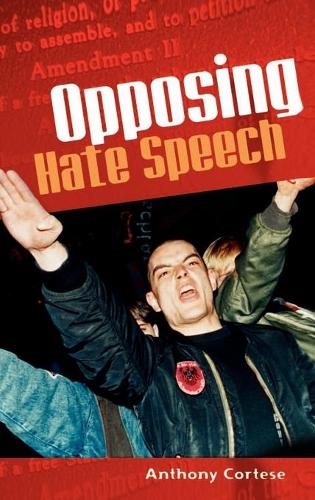
Opposing Hate Speech
(Hardback)
Publishing Details
Opposing Hate Speech
By (Author) Anthony Cortese
Bloomsbury Publishing PLC
Praeger Publishers Inc
30th November 2005
United States
Classifications
Professional and Scholarly
Non Fiction
Political science and theory
Gender studies, gender groups
323
Physical Properties
Hardback
248
Width 156mm, Height 235mm
510g
Description
What happens when two deeply held American values, freedom of expression and freedom from discrimination, clash In any well-established democratic society, people have the right to free speech as well as the right to equal treatment and protection under the law. But when one person's speech harms another person on the basis of race, ethnicity, religion, gender, or sexual orientation, it may qualify as hate speech and be subject to restriction. Cortese argues that restricting hate speech does not violate the guiding principle behind the First Amendment, but he is not eager to see more lawsuits. Effective restriction, he asserts, should not focus on litigation but on speech codes and moral education. Is there a limit to freedom of expression in a democracy, and if so, where should the line be drawn In attempting to answer that question, Cortese makes a solid case for paying attention to context and common sense. Some hate speech is more reprehensible than others; not all discriminatory statements are equally serious. There is a discernible difference between an offensive remark and an incitement to commit murder. There is also a fundamental distinction between intentional and unintentional discrimination. In this book, Cortese rethinks some of the issues that have been silenced in ways harmful to manyespecially those that have been brutalized, oppressed, manipulated, dominated, segregated, and disadvantaged. We should recognize the grave injuries inflicted by hate speech and the potential tensions between legal solutions to those injuries and the First Amendment. We must push for moral education, educational speech codes, and when necessary, a formal, legal-structural response to hate speech in order to reinforce our commitment to tolerance as a value.
Reviews
Employing critical race theory to structure his thesis, Cortese sketches a stage-developmental model of hate speech severity to make a case for the pervasiveness and perniciousness of hate speech in various institutional sectors of contemporary society.Recommended. General collections. * Choice *
Cortese provides his readers with tools for talking back to speech that incites hatred or violence based on religion, race, ethnicity, gender, or sexual orientation. Cortese sees prevention as a more effective technique than legal restrictions on hate speech; he outlines a rational basis for rejecting bigoted talk by focusing on equal treatment and equal protection under the law. His focus is on media sources--Web sites, film, television, radio, newspapers, magazines--as well as social movements, pride marches, and demonstrations that fight for minority rights and those that oppose them. He concludes by exploring what readers can do to counter and eliminate hate speech at the individual level. * Reference & Research Book News *
Author Bio
Anthony Cortese is Professor of Sociology at Southern Methodist University in Dallas, Texas. His major areas of research and teaching are social problems, ethnic and race relations, social policy, social ethics, media and gender, and sociological theory. He is the author of four other books, including Provocateur: Images of Women and Minorities in Advertising, 2nd ed. (2004).
